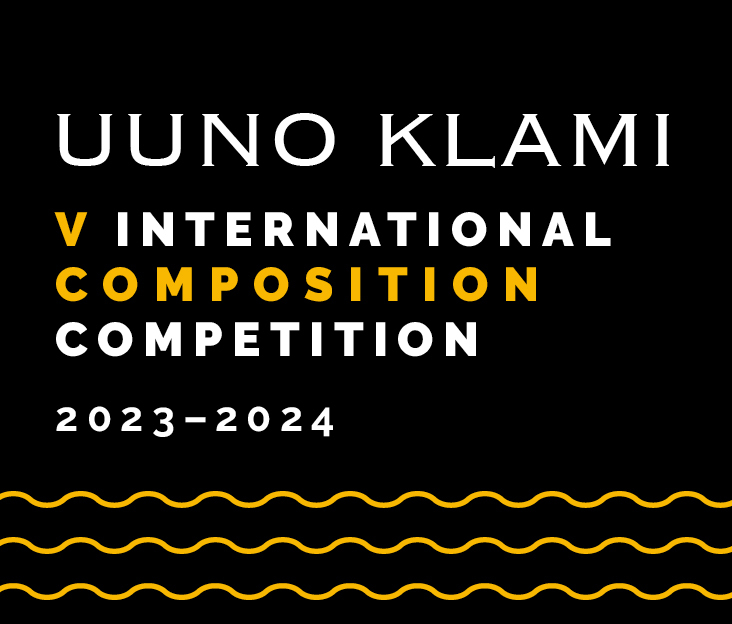DOWNLOADS
Entry form Anmeldeformular Formulaire D’inscription
Säännöt / Rules / Wettbewerbsregeln / Règlement
RULES IN ENGLISH
The aim of the V International Uuno Klami Composition Competition is to produce good new repertoire for a small orchestra of sinfonietta type: works the performance of which will not necessitate the costly hiring of many extras or unusual, difficult-to-find instruments.
The competition will culminate in finals concerts at which the results will be announced and the prizes awarded. These concerts will be held in the autumn 2024 season in Kouvola and Kotka, two towns in the Kymenlaakso region of Southeast Finland where Uuno Klami was born, and the results will be announced and the prizes awarded after the finals concert in Kotka. The orchestra at these concerts will be the Kymi Sinfonietta.
a) Participation in the competition is confined to Europe only. Contestants must be citizens of a Nordic country, of an EU Member State or of Albania, Andorra, Bosnia-Herzegovina, Kosovo, Liechtenstein, Macedonia, Moldavia, Monaco, Montenegro, San Marino, Serbia, Switzerland, Ukraine, the United Kingdom or the Vatican City State. Citizens from other countries must be permanently resident in one of the countries listed above and produce documentary evidence of their right to permanent residence. There is no age limit.
b) The competition entries must be scored for a smallish orchestra of sinfonietta type of not more than 2222/2200/01/0/ archi (maximum 6/5/4/4/2). In other words, the orchestra may consist of not more than the following:
2 flutes (piccolo or alto flute permissible instead of the 2nd flute), 2 oboes (cor anglais permissible instead of the 2nd oboe), 2 clarinets (E-flat clarinet permissible instead of the 1st clarinet and bass clarinet instead of the 2nd), 2 bassoons (double bassoon permissible instead of the 2nd), 2 French horns, 2 trumpets, 1 percussion player, 6 I violins, 5 II violins, 4 violas, 4 cellos and 2 double basses. Not more than two additional instruments may be included, one of which may be a solo instrument or voice. These additional instruments must be acoustic ones (but not organ). The use of electronics and tapes is not allowed. The orchestra may be smaller than that specified above on condition that it comprises at least 20 players and does not exceed the maximum stated for each instrumental section. Works that do not comply with these specifications will be disqualified.
c) Works entered for the competition must not have been previously published or performed. Only one entry is permitted per composer. Composers awarded a prize in a previous International Uuno Klami Composition Competition may not enter for the competition again, but the participation of composers whose works have been selected for the recommended list is permitted. The work must be 15–30 minutes long. The composer’s estimate of the duration must be marked in the score.
d) Entering the competition:
Compositions must be submitted to the Competition Office anonymously, under a pseudonym, in five identical copies and postmarked December 4, 2023 at the latest. Any entries bearing a later postmark will be disqualified. The first page of the score must indicate whether it is in C or transposing. The entry must be accompanied – in a separate, sealed envelope – by the entry form giving the following information: the name of the work, and the composer’s name, age, gender, postal address, telephone number (incl. international dialling codes), email address, nationality and signature indicating that he/she agrees to abide by the competition rules and the Jury’s decisions. The composer must also affirm that neither the work nor any part of it has previously been performed. A document proving permanent right of residence must be appended where applicable.
At the first assessment stage in early spring 2024 the Jury will choose at least three but not more than five of the anonymous entries for performance in the finals. The names of the finalists will then be announced and the finalists will be invited to attend the rehearsals for and premieres of their works. At this stage they will also be presented to the media. The finalists will be personally responsible for the costs incurred by them in attending the finals concerts (travelling expenses, accommodation). The competition will assist with travel and accommodation arrangements. The Jury will not place the works in order of merit until after they have been performed at the rehearsals and the finals concerts in autumn 2024.
e) The Jury will consist of composer Kalevi Aho (Chairman, Finland), composer Magnus Lindberg (Finland), composer Lotta Wennäkoski (Finland), composer Mats Larsson Gothe (Sweden) and, at a later stage, a conductor member Ernest Martínez Izquierdo.
The following prizes will be awarded:
I €11,000 / II €9,000 / III €7,000
Various sponsors will also be approached with a view to their awarding special prizes.
The Jury will have the right to divide the prizes in some other way.
f) The organisers reserve the right to premiere the winning works at the concerts in autumn 2024. The copyrights will remain with the composers. The organisers will have the right to broadcast, record, video, televise, film and photograph the competition performances and the finals concerts and to make sound and video recordings of these. The scores of all the works in the competition will be placed in the archive of the Uuno Klami Composition Competition Committee. Scores will not be returned to the composers. The Kymi Sinfonietta will have the right to perform works at a later date. All the composers will be informed in person whether or not they have reached the finals.
g) Entries should be sent to
The V International Uuno Klami Composition Competition
c/o Kymi Sinfonietta
Keskuskatu 33
FI-48100 Kotka
Finland
Further details of the competition are available from the Competition Office:
Ms Reetaliina Marin, Executive Director
Tel. +358 50 324 0058
Email: klamicompetition@kymisinfonietta.fi
Internet: www.klamicompetition.fi
The original language of these rules is Finnish. Any disputes will be solved on the basis of the Finnish text.
